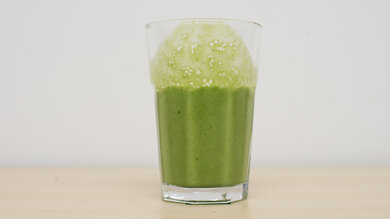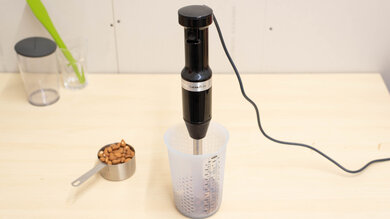
Immersion blenders, also called hand blenders or stick blenders, are handy kitchen tools that can save you the trouble of transferring your recipe into a blender jar. You can stick their blending arms directly into a pot or pan, making them helpful for turning hot ingredients into soups and sauces. The best stick blenders can also work as multi-purpose blenders, especially if you want to save space with something that can fit in a kitchen drawer. Many immersion blenders come with jars that you can use for blending, and some include attachments like whisks or extra blades, so they can help with a wide variety of cooking tasks, like making smoothies, frozen drinks, batters, and dips.
Cordless immersion blenders can offer a comparable performance to conventional plug-in models and give you the freedom to move around the kitchen. However, some immersion blenders come with a warning not to run the blender continuously for more than a few minutes. Also, most aren't as well-suited as a full-size or personal blender if you want to make smoothies for the whole family or process tougher ingredients like nuts and ice cubes.
We've tested 20 immersion blenders, and below are our recommendations. For more options, check out the best blenders, the best personal blenders, and the best blenders under $100.
-
Best Immersion Blender
Multi-PurposeSmoothies (Single Serving)Smoothies (Multiple Servings)Ice CrushingSoupsProfessional UseThe Ninja Foodi Power Mixer System is the best immersion blender we've tested. It's an excellent choice for blending hot ingredients directly in the pot or pan they were cooked in, and its features make it a good multi-purpose appliance if your kitchen is short on space. Its small size and detachable blending arm make it easy to store in a drawer, and this model smoothly blends fibrous ingredients, which is important for smooth vegetable soups and purees. It also converts into a hand mixer. With the included beaters attached, you can use the blender to mix cookie dough or cake batter. A beaker and a whisk attachment for whipping cream or mixing salad dressing are also included. The blending arm and all accessories are dishwasher-safe.
There are downsides: it's loud for an immersion blender, and the motor body is heavy, so it's more tiring to hold onto than lighter models. You might not use the extra attachments if you're not a baker. If you'd prefer an immersion blender that doubles as a food processor, the Breville Control Grip is an immersion blender with a bowl and blade meant for chopping and slicing. However, its blending arm doesn't handle raw fibrous ingredients as well as the Ninja's. If all you need is a blender and any extra attachments will accumulate dust in a cupboard, consider one of the cheaper options below.
-
Best Mid-Range Immersion Blender
Multi-PurposeSmoothies (Single Serving)Smoothies (Multiple Servings)Ice CrushingSoupsProfessional UseThe KitchenAid Variable Speed Corded Hand Blender is a more basic and less expensive option. Unlike the Ninja Foodi Power Mixer System, it doesn't include a mixer or food processor attachments, so it's not quite as versatile. However, it's a good option for blending soups, sauces, and other liquid recipes like smoothies. It comes with a plastic pan guard to protect non-stick pans from getting scratched by the blade bell and a beaker that you can use to blend smaller quantities of dip or dressing. A pressure-sensitive button on the motor body controls the blending speed, and this blender is quieter than the previous pick.
However, it makes a less smooth blend with fibrous ingredients than the Ninja, so if you use it to blend a big pot of soup with kale or broccoli, some unprocessed bits will be left over. It also takes longer to process these ingredients, but it's a little lighter, so it's less tiring to hold onto when you need to blend for several minutes. Unfortunately, some parts of the blender feel cheap or plasticky, and the blending arm isn't dishwasher-safe.
-
Best Budget Immersion Blender
Multi-PurposeSmoothies (Single Serving)Smoothies (Multiple Servings)Ice CrushingSoupsProfessional UseThe best budget immersion blender we've tested is the NutriBullet Immersion Blender. This straightforward blender doesn't come with a food processing attachment, a pan guard, or a beaker. However, its whisk attachment helps make whipped cream or hollandaise sauce. Its blending performance resembles the KitchenAid Variable Speed Corded Hand Blender's. It makes a fairly smooth blend with fibrous vegetables like kale and broccoli, so it can produce well-blended soups and sauces.
Since it doesn't come with a beaker, you need to use your own container when you're not blending directly in a pot or pan, which is slightly inconvenient if you want to make a quick smoothie or whip up a small batch of salad dressing. The blender is decently well-built and quiet but makes more noise than the KitchenAid, so it'll be more annoying when you need to blend for several minutes. The detachable blending arm isn't dishwasher-safe, but it's easy to clean by hand.
-
Best Cordless Immersion Blender
Multi-PurposeSmoothies (Single Serving)Smoothies (Multiple Servings)Ice CrushingSoupsProfessional UseIf your kitchen is short on outlets or you want to avoid cable management near the stove, you might prefer a cordless immersion blender. The best one we've tested is the KitchenAid Go Cordless Hand Blender. This decently well-built blender comes with a beaker you can use for blending with a matching storage lid. While it takes longer to process fibrous ingredients than our top pick, it produces similar results, so recipes like kale smoothies or broccoli soup will only have a few small unprocessed pieces left over. There's also a plastic pan guard included to protect non-stick cookware.
It's advertised to last 30 minutes of continuous use, although thicker mixtures and harder ingredients deplete the battery faster. It stands out from other battery-powered hand blenders because the battery is removable. You can use the same battery with five other KitchenAid Go appliances, including a personal blender, so you can save money by purchasing the other appliances without the battery included. This blender isn't very loud when it's running, but keep in mind that it's not as well-built as the Ninja Foodi Power Mixer System despite its higher price. It's even less suitable for tough blends like nut butter or hummus.
-
Best Small Immersion Blender
Multi-PurposeSmoothies (Single Serving)Smoothies (Multiple Servings)Ice CrushingSoupsProfessional UseIf you want a smaller, lighter immersion blender, consider the Braun MultiQuick 5. This well-built blender is lighter than the other picks on this list, so you might prefer it if you use your immersion blender to blend big batches and sometimes find it tiring to hold onto the whole time. The blending arm is quite short, which can be a problem if you need to blend in deep pots, but it also makes it easier to store in a kitchen drawer. It's a little more expensive than the KitchenAid KHBBV53 but has a sturdier build and comes with a whisk attachment for making whipped cream and salad dressing. There's also a 20oz beaker included to use for blending.
The narrow blade guard makes ice crushing almost impossible, but it can power through thicker mixtures and produce smooth nut butter or hummus. It's not very loud and is easy to clean by hand—however, the KitchenAid and the Ninja Foodi Power Mixer System are better for processing fibrous ingredients. This blender leaves behind more noticeable grains and leafy bits when blending ingredients like raw kale or broccoli. Cooked ingredients are easier to blend, so you may not notice as much of a difference in recipes like soups, but the Braun isn't ideal if you want the silkiest blends from fruits and vegetables.
Notable Mentions
- All-Clad KZ750DGT: The All-Clad KZ750DGT does a good job of processing fibrous ingredients into a smooth blend. It has a longer blending arm than the Ninja Foodi Power Mixer System but has a much less sturdy design. See our review
- KitchenAid 5-Speed Hand Blender: The KitchenAid 5-Speed Hand Blender has a bowl and blades for food processing. It's not as well-built as the Ninja Foodi Power Mixer System and isn't as good at blending fibrous ingredients, but it comes with various extra blades, including an 'S-blade' that works well for ice crushing. There's also a frother/beater attachment for mixing batter or foaming milk. See our review
Recent Updates
-
May 22, 2024: The text has been updated and checked for accuracy, but there hasn't been a change to our recommendations.
-
Apr 26, 2024: We've replaced the KitchenAid KHBBV53 with the KitchenAid Go Cordless Hand Blender as the cordless pick because of its better build quality and blending performance.
-
Mar 26, 2024: We've made minor updates to the text and checked that the products are available.
-
Feb 27, 2024: We've checked that the picks represent the best recommendations and that the products are in stock.
-
Feb 01, 2024: We've updated the text and verified that the picks are easy to find in stock.
FAQ
What is an immersion blender?
Immersion blenders, also called stick blenders or hand blenders, are meant for processing hot ingredients directly in a pot or pan. They can also be used for a variety of other blends, although they don't usually offer the same power as full-size blenders. Their smaller design can save space in your kitchen.
Unlike other kinds of blenders, immersion blenders require you to hold them while using them. They usually aren't as powerful as full-size blenders and process ingredients more slowly. We've found that the blender's weight, controls, and the shape of the motor body can all affect how easy a particular immersion blender is to use.
How do we test immersion blenders?
We test them almost the same way as we do with full-size and personal blenders, with some small differences. We measure blending arm length as well as other dimensions. We don't crush a dozen ice cubes at once with an immersion blender like we do for full-size blenders. Immersion blenders aren't given a capacity score since, even if a beaker is included, you can use the blender in your own container.
What are immersion blenders used for?
They were originally designed for hot blending and are well-suited for that. You can blend pureed soup or sauce without pouring hot ingredients into a blending jar. Their compact design is also helpful for blending small batches of dips, dressing, or even single-serve smoothies without pulling out your big full-size blender. You can usually store them in a kitchen drawer, so they can also appeal to people looking to save valuable counter space.
Can you use immersion blenders for smoothies?
Yes, but other blender types are better. Some can make a mostly smooth blend with fibrous ingredients like blueberries and kale in liquid recipes, which is important for well-blended smoothies. Some models come with beakers that are a good size for single-serve smoothies. However, immersion blenders usually don't process ingredients as quickly as personal or full-size blenders.
Can you froth milk with an immersion blender?
Generally, blender blades aren't the right shape for frothing or foaming milk and can't produce the same quality foam as dedicated milk frothers. You also need to heat the milk beforehand, unlike frothers, which also heat the milk. If you want an appliance for lattes and cappuccinos, some immersion blenders have special accessories for milk frothing, like the KitchenAid 5-Speed Hand Blender and Bamix Mono M133.
How do you clean immersion blenders?
Immersion blenders are usually pretty easy to clean. You don't need to deal with blades fixed to the bottom of a jar, which is the most common design for full-size blenders. The blending arm is almost always detachable, so you can easily rinse it in the sink.
All Reviews
Our recommendations above are what we think are currently the best hand blenders for most people. We factor in the price, feedback from our visitors, and availability.
If you'd like to choose for yourself, here's the list of all our immersion blender reviews. Be careful not to get too caught up in the details. While no blender is perfect for every use, most are good enough to please almost everyone, and the differences are often not noticeable unless you really look for them.
























